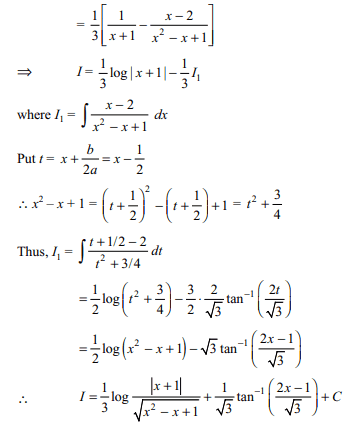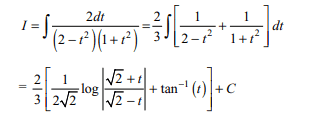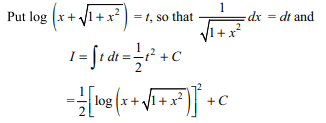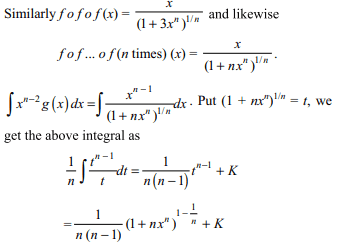1.If \[I=\int\frac{dx}{x^{3}+1}\]
then I is equal to
a) \[\frac{1}{3}\log\frac{\mid x+1 \mid}{\sqrt{x^{2}-x+1}}+\frac{1}{\sqrt{3}}\tan^{-1}\left(\frac{2x-1}{\sqrt{3}}\right)+C\]
b) \[\frac{1}{3}\log\left(x^{2}-x+1\right)+\tan^{-1}\left(\frac{x+1}{\sqrt{3}}\right)+C\]
c) \[\frac{1}{3}\log\left(x^{2}-x+1\right)+\frac{1}{3}\log\mid x+1 \mid+\tan^{-1}\left(\frac{2x-1}{\sqrt{3}}\right)+C\]
d) \[\frac{1}{3}\log\left(x^{2}-x+1\right)+\frac{1}{6}\log\mid x+1 \mid+\tan^{-1}\left(\frac{2x-1}{\sqrt{3}}\right)+C\]
Explanation:


2. If \[I=\int\frac{dx}{\sin^{3}x+\cos^{3}x}\]
then I is equal to (Where t = sin x + cos x)
a) \[\frac{1}{3\sqrt{2}}\log\mid\frac{\sqrt{2}+t}{\sqrt{2}-t} \mid+\tan^{-1}\left(t\right)+C\]
b) \[\frac{1}{3\sqrt{2}}\log\mid\frac{\sqrt{2}-t}{\sqrt{2}+t} \mid+\frac{1}{3}\tan^{-1}\left(t\right)+C\]
c) \[\frac{1}{3\sqrt{2}}\log\mid\frac{\sqrt{2}+t}{\sqrt{2}-t} \mid+\frac{2}{3}\tan^{-1}\left(t\right)+C\]
d) \[\frac{1}{3\sqrt{2}}\log\mid\frac{\sqrt{2}+t}{\sqrt{2}-t} \mid-\frac{2}{3}\tan^{-1}\left(t\right)+C\]
Explanation:



3.If \[I=\int\sec^{-1}\sqrt{x} dx\]
then I is equal to
a) \[x \sec^{-1}\sqrt{x} -\log \left(1+x\right)+C\]
b) \[ \sec^{-1}\sqrt{x} -\tan^{-1}\sqrt{x}+C\]
c) \[ x \sec^{-1}\sqrt{x} -\sqrt{x-1}+C\]
d) \[ x \sec^{-1}x +\sqrt{x-1}+C\]
Explanation:

4. If \[I=\int\frac{dx}{\sin\left(x-\pi/3\right)\cos x}\]
then I is equal to
a) \[2\log \mid\sin x+\sin\left(x-\pi/3\right)\mid +C\]
b) \[2\log \mid\sin\left(x-\pi/3\right)\sec x\mid +C\]
c) \[2\log \mid\sin x-\sin\left(x-\pi/3\right)\mid +C\]
d) none of these
Explanation:


5. If \[I=\int\frac{\log\left(x+\sqrt{1+x^{2}}\right)}{\sqrt{1+x^{2}}}dx\]
then I is equal to
a) \[\frac{1}{2}\log\left(x+\sqrt{1+x^{2}}\right)+C\]
b) \[\frac{1}{2}\left[\log\left(x+\sqrt{1+x^{2}}\right)\right]^{2}+C\]
c) \[\log\left(x+\sqrt{1+x^{2}}\right)+C\]
d) \[x log\left(x+\sqrt{1+x^{2}}\right)+C\]
Explanation:

6. Let \[f\left(x\right)=\frac{x}{\left(1+x^{n}\right)^{1/n}}\] for \[n\geq 2\] and g(x) = f o f .... o f (x) (n times). Then \[\int x^{n-2} g\left(x\right)dx\] equals
a) \[\frac{1}{n\left(n-1\right)}\left(1+nx^{n}\right)^{1-\frac{1}{n}}+K\]
b) \[\frac{1}{n-1}\left(1+nx^{n}\right)^{1-\frac{1}{n}}+K\]
c) \[\frac{1}{n\left(n-1\right)}\left(1+nx^{n}\right)^{1+\frac{1}{n}}+K\]
d) \[\frac{1}{n-1}\left(1+nx^{n}\right)^{1+\frac{1}{n}}+K\]
Explanation:


7. Let \[I=\int\frac{e^{x}}{e^{4x}+e^{2x}+1}dx,J=\int\frac{e^{-x}}{e^{-4x}+e^{-2x}+1}dx\]
Then, for an arbitrary constant C, the value of J-I equals
a) \[\frac{1}{2}\log\frac{e^{4x}-e^{2x}+1}{e^{4x}+e^{2x}+1}+C\]
b) \[\frac{1}{2}\log\frac{e^{2x}+e^{x}+1}{e^{2x}-e^{x}+1}+C\]
c) \[\frac{1}{2}\log\frac{e^{2x}-e^{x}+1}{e^{2x}+e^{x}+1}+C\]
d) \[\frac{1}{2}\log\frac{e^{4x}+e^{2x}+1}{e^{4x}-e^{2x}+1}+C\]
Explanation:


8. If \[I=\int\frac{\left(x^{2}+1\right)^{2}}{\left(x^{113/25}+\frac{11}{3}x^{63/25}+11x^{13/25}\right)^{5}}dx=\lambda\left(x^{a}+\alpha x^{b}+11 x ^{c}\right)^{-k}+C\]
then
a) \[\lambda =-\frac{5}{88}\]
b) \[b =\frac{12}{5}\]
c) k=4
d) All of the Above
Explanation:


9. If \[I=\int\frac{\sqrt{1+ln x}}{xln x} dx= a f\left(x\right)+\frac{b}{2}ln\mid\frac{f\left(x\right)+c}{f\left(x\right)+d} \mid+K\]
then
a) c+d=0
b) a=b
c) \[f\left(x\right)=\sqrt{ln (ex)}\]
d) All of the Above
Explanation:


10. Let \[f\left(x\right)=\frac{\left(2x-1\right)\sqrt{x^{2}+x+1}-\left(2x+1\right)\sqrt{x^{2}-x+1}}{\left(2x-1\right)^{2}\left(x^{2}+x+1\right)-\left(2x+1\right)^{2}\left(x^{2}-x+1\right)},x\neq0\]
and \[I=6\int\frac{xf\left(x\right)}{\sqrt{x^{4}+x^{2}+1}}dx\]
then I is equal to
a) \[2\left(\sqrt{x^{2}+x+1}-\sqrt{x^{2}-x+1}\right)+C\]
b) \[\frac{4x}{\left(\sqrt{x^{2}+x+1}+\sqrt{x^{2}-x+1}\right)}+C\]
c) \[\frac{8x}{\sqrt{\left(2x+1\right)^{2}+3}+\sqrt{\left(2x-1\right)^{2}+3}}+C\]
d) All of the Above
Explanation:
